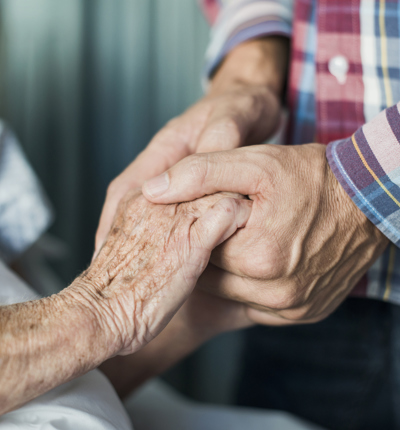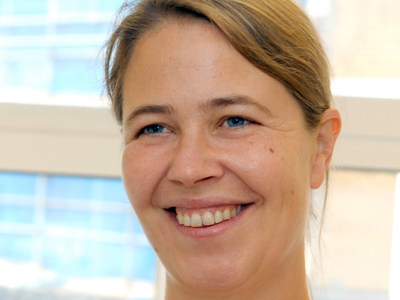
'Why I am taking legal action against Matt Hancock over do not resuscitate orders'
Leigh Day client Kate Masters writes about her legal challenge to the government for failing using emergency powers to ensure that families understand how decisions are made about DNR orders amid the COVID-19 pandemic.
Posted on 17 June 2020
As I write this, there is yet another story in the news of a care home that received a letter from a GP surgery saying a note would be put in the residents’ medical notes to say that, should they have a cardiac arrest, no ambulance would come to help, they would not be resuscitated, and they would not be taken to hospital.
An apparent blanket DNACPR decision with no discussion or individual assessment of people’s clinical circumstances. There have been many similar stories reported since the start of the Coronavirus pandemic. Every one of them makes my heart heavy, because this is a situation my family has tried very hard to ensure does not happen.
Nine years ago, I’d never heard of DNACPR. They do say that what’s meant to touch you doesn’t pass you by, and this was to be an issue that would be life-changing for my family.
In February 2011, two weeks after being diagnosed with terminal cancer, my mum broke a bone in her neck in a car accident.
It was during mum’s time in hospital for treatment of the injuries sustained in the crash that the subject of DNACPR was first raised. To us it was just a form that mum did not want that had been placed in her notes, then removed at our request.
Mum had made her decision, and that, we thought, was that. But the doctors kept raising the subject with mum to the point that she felt badgered and asked the doctors not to speak to her about it anymore unless a member of the family was present.
The doctors didn’t talk to mum about it again, but did talk to the rest of the family about it. All we could say that was mum did not want the form.
After mum died, we asked for a copy of mum’s medical records. At the top of the pile was a DNACPR form written two days before mum’s death stating that we had all agreed to it.
We had many questions about mum’s treatment, but the main one that stuck in our heads was “why was this form so important to the medics?”
When we looked into it further, we discovered that, when mum said she did not want the form, it was not actually her decision to make. Patient consent is only needed for treatments that are to be provided, not withheld. DNACPR is a decision to not provide CPR.
The fact that consent is not needed remains one of the most misunderstood issues relating to DNACPR. We discovered that DNACPR is often the first medical decision that is made when doctors think you are dying.
We discovered that when a DNACPR decision is made it should only relate to not offering CPR. We discovered that sometimes DNACPR decisions are incorrectly made based on age, or disability.
Most frighteningly, we discovered that, although it was best practice to do so, there was no legal requirement for the decision to be discussed with the patient. We discovered that what happened to mum had happened repeatedly over the years.
We spoke with people who had also discovered undiscussed DNACPR forms in medical notes of a loved one who had died, or had been slipped into the side of bags when they were sent home from hospital.
These people were often furious, fearful, left feeling they or their loved ones had been written off, even murdered. An undiscussed DNACPR can irreparably harm the vital trust relationship between doctors and patients.
We discovered that DNACPR is so much more than just a form.
My mum ran a care home for older people, and dedicated her life to her residents. Driven by the knowledge that mum would not have wanted what happened to her to happen to the people she cared for, dad decided to take legal action to secure the right for people to be involved in DNACPR decisions. On 17 June, 2014 dad won his legal case.
I have been privileged to be invited to work with doctors in educational programmes since June 2014. Doctors have told me of barriers to having these important discussions. One consistent issue is the lack of time or privacy. This has come into sharp focus with the pandemic increasing demands on clinicians’ time, and making face to face contact difficult.
In my experience it is not a lack of care for patients at the heart of the terrible stories that have been in the news but that there appears to have been a national directive for doctors to put emergency plans in place for people at risk of becoming very unwell if they catch Covid-19, without them having access to nationally available information for them to engage fully in the process.
Just a few simple pieces of information would help, and I list them below. Matt Hancock has refused my request to provide this information on the NHS website, so that people facing these discussions can access it, leaving doctors free to concentrate on explaining the clinical reason and helping people make plans for future treatments.
Instead Matt Hancock has said the information currently available is sufficient, despite it being heavily focused on those wanting to make their own advance decisions – which is really a different issues to doctors deciding that their patient should be DNACPR without their input or the opportunity of seeking a second opinion.
In fact, the information one can access online about Advance Decisions is confusing about DNACPR and gives a misleading impression. It says “you can change your mind and your DNACPR status at any time”.
This is just not right. Except in the special circumstances where a patient makes an advance decision to refuse treatment, DNACPR status is not something a patient always chooses but is often a decision made by the treating team after consultation with the patient and, where appropriate, relevant family members.
The legal requirement to consult gives the patient or family the opportunity to seek a second opinion if they are concerned about the decision or think it is premature or inappropriate.
Until this clear information is readily available about how these decisions are supposed to be made and what the patient’s and family’s role is in such decisions, we will continue to hear stories of frightened and angry people turning to lawyers, journalists, and social media for information.
In my eyes, it is a small ask that could have such a big impact, and I am prepared to go as far as I need to ensure people are given access to this information about their rights.
- By law, you have to be asked if you want to be involved, but if you don’t your doctor will make the DNACPR decision for you.
- The terminology relating to a DNACPR can be confusing – it can also be called a DNR, DNAR, and be part of the ResPect process.
- The decision must only relate to withholding CPR.
- It is a decision that can be made as part of a patient-led advance decision to refuse treatment (ADRT) but when made by a doctor, it does not need patient consent.
- It must be explained why, in clinical terms, a decision to not provide CPR is being made. If this is because you are dying, your wishes on end of life care must be sought.
- What to do if you do not agree - a second opinion is not an automatic right, but should be arranged.
- Blanket decisions for particular groups of people – for example based on age, or disability, are unlawful
Kate is represented by human rights lawyer, Merry Varney. She is crowdfunding her legal challenge.
Kate's opinion piece appeared in the Independent on Saturday, 13 June.



